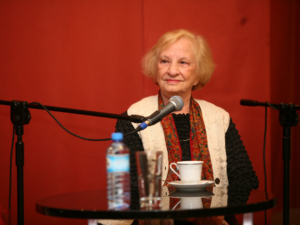In the United States, the number of books published in translation is famously low. A popular estimate is 3% of all literary fiction and poetry. A translator’s name is usually included in small print on the title page of a printed book — rarely on the cover — and even the most prolific translators often remain in the shadows. Many people can name a favorite author, but how many of us have a favorite translator?
Yet despite having a job that, by nature, goes relatively unseen, translators wield incredible power. They are, in a sense, trusted to write anew the great works of others. Nobel prize winner José Saramago once said, “World literature is created by translators.” And the stakes are high indeed: the 1989 fatwa calling for Salman Rushdie’s death in response to the publication of The Satanic Verses led to the murder of Rushdie’s Japanese translator and the attempted assassinations of his Italian, Norwegian, and Turkish translators.
Even on the page itself, a translation can mean the difference between life and death: Constance Garnett, who was responsible for bringing Tolstoy, Dostoyevsky, and Chekhov to English readers in the early 20th century, worked so quickly that she had a habit of skipping or changing lines that gave her trouble. A 2005 New Yorker article describes Nabokov’s reaction to a Garnett translation: “where a passage in the Garnett of ‘Anna [Karenina]’ reads, ‘Holding his head bent down before him,’ Nabokov triumphantly notes, ‘Mark that Mrs. Garnett has decapitated the man.’ ”
For translators long familiar with the paradoxical work that is literary translation, and for the rest of us to whom such travails are wholly unfamiliar, we sought to ask a wide swath of translators about their work. From those working in Icelandic to those translating from French, from those just beginning their careers to those long-established, we survey the ferrymen and women who battle the tide to bring literature to foreign shores.
For more responses to our questionnaire, click here.
* * *
 Danuta Borchardt began her work as a translator in 1993 upon retiring from a long career as a psychiatrist and instructor of Clinical Psychiatry at the Harvard Medical School. She is perhaps best known for her acclaimed translations of Witold Gombrowicz, the most recent of which is Trans-Atlantyk.
Danuta Borchardt began her work as a translator in 1993 upon retiring from a long career as a psychiatrist and instructor of Clinical Psychiatry at the Harvard Medical School. She is perhaps best known for her acclaimed translations of Witold Gombrowicz, the most recent of which is Trans-Atlantyk.
What is the most recent problem you ran into in a translation (a sentence, a word, a phrase)? How did you solve it?
It was none of these items but an entire text. It was my translation of Witold Gombrowicz’s second novel Trans-Atlantyk. The author wrote it mostly in archaic Polish, dating back to the baroque era. I solved this problem by learning, for me, a new language — reading English texts of the equivalent time period. I immersed myself in Swift’s Gulliver’s Travels and perused Laurence Sterne’s Tristram Shandy. I say “perused” because a full reading of this nine-volume work was not essential to my purpose. Since Gombrowicz’s language also came from the 19th century, reading Moby Dick was most helpful. I gleaned from these texts new words, characteristic rhythm and syntax, essential for transferring Gombrowicz’s language into English.
Translators have enormous power over a text. How do you respond to this power? Can translation ever be unethical?
I have not thought of power in reference to my translations. I have written in my Translator’s Note for the publication of Gombrowicz’s first novel Ferdydurke: “my guiding principle was to approach Gombrowicz with humility and the reader with audacity.” The audacity was to carry the English text as far as the Polish text required it and the English as far as it could go for a brave reader of, specifically, Ferdydurke.
There’s that famous Italian expression, “Traduttore, traditore” (a play on the words for “translator” and “traitor”). And the poet and translator Rosmarie Waldrop writes, “Translating is not pouring wine from one bottle into another. Substance and form cannot be separated easily . . . Translation is more like wrenching a soul from its body and luring it into a different one. It means killing.” Why is it that the concept of translation can inspire such violent comparisons? To what extent does your own translation work feel like an act of destruction?
These are fighting words! I am averse to killing, except for disease-bearing mosquitoes and some other sentient beings carrying, say, rabies, even though I am not a Buddhist. I see translation more as a process of carrying something, people, across a river, from one bank to the other, safely and beautifully. I chose a river rather than a lake, because if its turbulence, ebb and flow, that a lake does not have.
The word “faithful” often comes up in discussions of translation. To whom or what is a translation faithful? Is a faithful translation good? Is a good translation faithful?
I am a stickler for the “faithful.” Most of my translations are word-for-word transpositions of the source into the target (I understand some people don’t like this word, nor am I shooting at a target when I translate!) language. A translation needs to be faithful/accurate in conveying the author’s meaning, as well as in rendering the beauty of his/her text. Without improving on it — this is most important! I’m often surprised how well Polish words or even some idioms fit the English. If a translation does not comply with these criteria it is outright unethical because it shortchanges the original author and cheats the English reader.
When do you know that a translation is finished?
Translations of some works are never finished as the multitude of their alternate translations shows. There is always room for improvement. I feel that mine is finished when I’m satisfied that nothing has been inadvertently omitted, when the meaning is clear, and — as its editor — I enjoy reading it. The rest is visceral. I’ve done it, can do not more!
What kinds of books and genres in your source language(s) are translated into English most often? What are the books, genres, styles that you would most like to have translated?
I have no expertise to answer the first question. I know that a lot of literature, namely poetry and fictional prose, has been translated, but I’m ignorant as to the rest. My preferred field is fictional prose and post-romantic but prior to contemporary poetry.
Why do you translate?
Because I love writing. My first love is writing fiction and some poetry, though in recent years I have been training in and trying my hand at the memoir/personal essay genre. To me, writing and translating are two interweaving processes that reinforce each other. Since I translate from my native language into an acquired one, I derive particular satisfaction from delving, in language, into my native Polish core. Having been an exile of many years, this has a particular relevance and poignancy. The other side of the coin is the fact that I love the English language, its succinctness in conveying both ideas and beauty. Enough said
This post may contain affiliate links.







